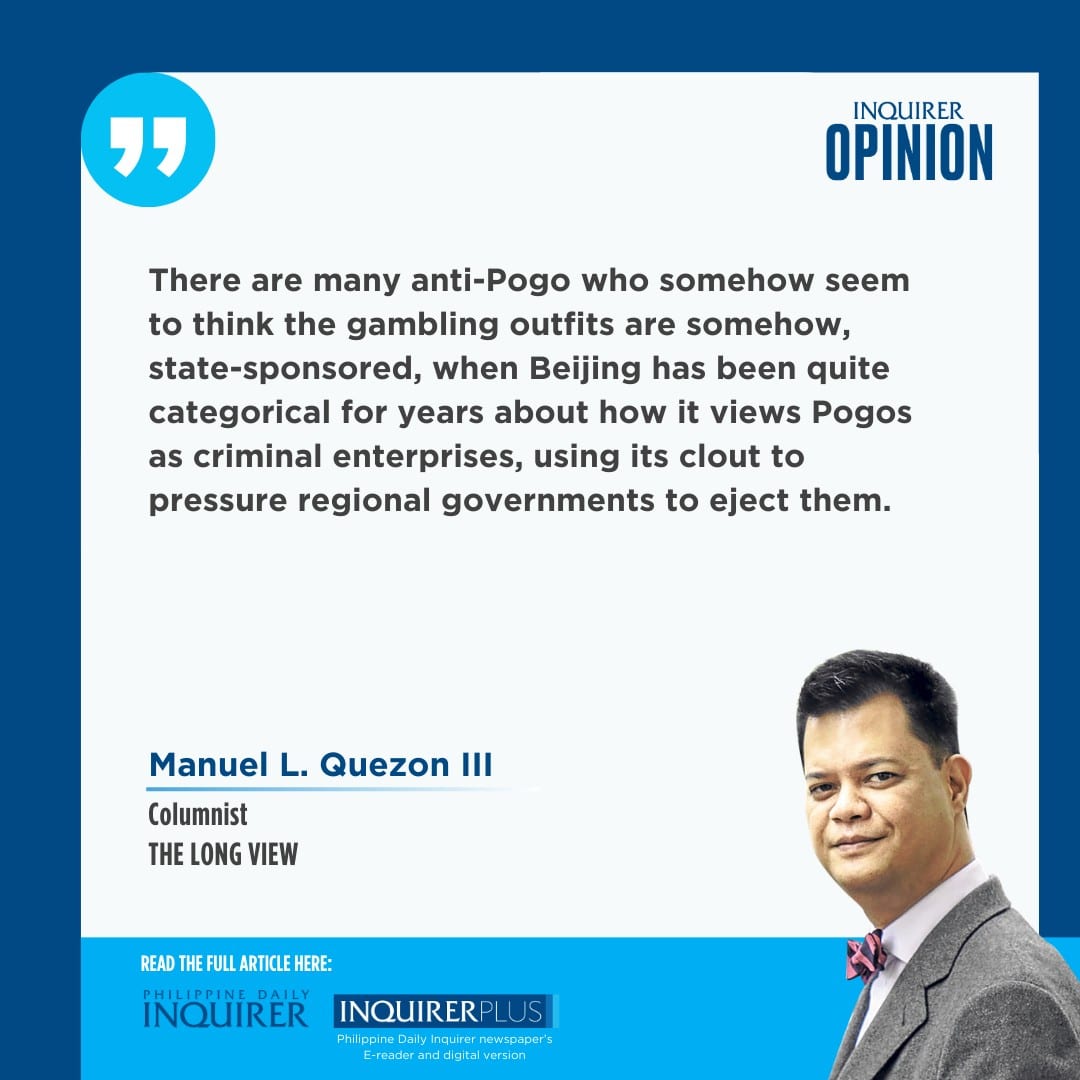In my last column, I suggested that President Marcos’ ban on Philippine offshore gaming operators (Pogos) might accomplish one of the biggest transfers of wealth and assets since the Duterte administration (when the sudden escalation in the number of Mindanawon scions of families both prominent and hitherto unknown, to Metro Manila private schools, as well as anecdotes from car aficionados, is the telltale sign of the Southern bonanza over six years). Property owners from the upper and middle classes get to keep the rents paid, sometimes years in advance; and as Pogos either leave or are expelled, their immovable assets will be bought or seized by the enterprising, ruthless, lucky, or all three.
Ironically, this is one official decision that might actually please Beijing, too. In their zeal to score political points or simply pander to public opinion, they essentially push a 19th-century-style racist angle—a “Yellow Peril”—which is why there are many anti-Pogo who somehow seem to think the gambling outfits are somehow, state-sponsored, when Beijing has been quite categorical for years about how it views Pogos as criminal enterprises, using its clout to pressure regional governments to eject them.
Two investigative pieces abroad around the time the President made his announcement illustrate the point I want to make. On July 21, The New York Times published an article, ”The Billionaire Criminal Who Secretly Profited Off Jack Ma’s Deals,” about how “Xiao Jianhua, a corrupt investor tied to China’s political elite, backed the country’s most successful and revered entrepreneur.” The next day, July 22, The Washington Post published “A Chinese actor was enslaved in a compound running online scams,” in which the paper revealed, “more than 200,000 people are being forced to work as scammers in Myanmar, Cambodia, and Laos.” These articles illustrate my point because they zeroed in on the intersection between racketeers and gangsters operating not just Pogo but other offshore entities, and corrupt Chinese officials—and officials in high places, eager to get a piece of the economic action through dummies and syndicates trafficking in influence and favors.
So when veteran journo Jim Gomez of the Associated Press reported that Beijing gave a rare compliment to Mr. Marcos, you can see why—and see why those who conflate Pogos and other condemned overseas Chinese activities with China’s government as a whole, are seriously misappreciating matters. Beijing’s statement of approval for the recent Marcos pronouncement in turn reflects its frustration with former president Rodrigo Duterte who would not, because he could not, do anything about Pogos except roll out the red carpet for them because of the bonanza of cash of all kinds, licit and illicit, they poured into the pockets of Filipinos from the highest to the lowest political and economic classes of this country. A bonanza that Beijing, not keen to throw good money after bad, was never as forthcoming to provide to its Filipino fair-weather friends.
Mr. Marcos hit the nail on the head when his initial reaction to the Alice Guo exposé was to express surprise because his peers in the political class didn’t know her, so how could she be anybody? Except that very fact revealed how weakened the political class was, that the traditional barons were now blind in their old domains.
The past three to four decades have already seen widespread domestic migration, weakening old political networks and ties; even ethnic groups have experienced something similar, the established Chinese Filipino merchant class has, for some decades now, clashed with a new generation of migrants not from the same region of China and who ruthlessly competed (by now, they have risen in the world enough to start wanting to be players not just in the provinces but in Metro Manila), just as the overseas Filipino workers who rose to middle-class status, despite not being part of the churches, clubs, or schools which formed the attitudes and identity of our middle class, have rebelled, first socially then politically, against the old middle class and the upper class they once aspired to emulate.
Hence the new political divide: A showdown between the old loyalties, certainties, and aspirations represented by the incumbent, and the dangerous insolence, bruteness, and brashness it sees in the administration it replaced, and which now dreams of its own restoration.
—————–
Email: mlquezon3@gmail.com; Twitter: @mlq3
